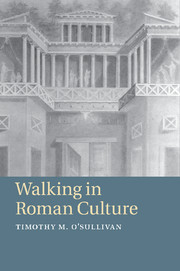Book contents
- Frontmatter
- Contents
- Figures
- Acknowledgements
- Abbreviations
- Introduction
- Chapter 1 The art of walking
- Chapter 2 Seneca on the mind in motion
- Chapter 3 Urban walkers on display
- Chapter 4 Cicero’s legs
- Chapter 5 Theoretical travels
- Chapter 6 Walking with Odysseus
- Conclusion
- Bibliography
- Subject index
- Index locorum
Chapter 5 - Theoretical travels
Published online by Cambridge University Press: 05 August 2011
- Frontmatter
- Contents
- Figures
- Acknowledgements
- Abbreviations
- Introduction
- Chapter 1 The art of walking
- Chapter 2 Seneca on the mind in motion
- Chapter 3 Urban walkers on display
- Chapter 4 Cicero’s legs
- Chapter 5 Theoretical travels
- Chapter 6 Walking with Odysseus
- Conclusion
- Bibliography
- Subject index
- Index locorum
Summary
In the opening scene of Varro’s De re rustica, the author arrives at the temple of Tellus on the Carinae in Rome only to find some acquaintances already there, contemplating a picture of Italy on the wall. After some brief pleasantries, one of these acquaintances, Agrasius, initiates the dialogue proper with a question: “Tell me, since you’ve all walked through many lands, have you ever seen a place more cultivated than Italy?” (Rust. 1.2.3: vos, qui multas perambulastis terras, ecquam cultiorem Italia vidistis?). Agrasius’ use of perambulare (“walk through”) to refer to extensive travels is particularly suggestive. As the opening question reveals, the painting of Italy is not only the inspiration for their conversation, but also a visual metaphor for the entire book, which invites the reader to contemplate Varro’s representation of the fertile Italian countryside. The reference to travel thus anticipates the discussion that follows: although the participants sit on benches in the middle of Rome, their conversation will stroll through Italian farms and fields.
As we shall see in this chapter, walking is an apt metaphor for the travels that Varro and his friends have undertaken throughout the Mediterranean, and are about to embark on in their dialogue. This intersection of literal and metaphorical journeys encapsulates a cultural metaphor that exerted great influence on Greek philosophical thought and Roman leisure practices: the connection between the movement of the body and the accumulation of knowledge. The principal example of this association is, of course, travel. As the traveler encounters new people and places, his or her understanding of the world broadens; there is knowledge that can only be gained by being away from home. The ancient Mediterranean and Near East abounded in stories of lessons learned abroad. As Silvia Montiglio has shown, in sixth- and fifth-century Greece, wandering transformed from an activity with ambivalent associations at best to a mode of existence actively pursued by sages and authors. Indeed travel became so associated with wisdom that philosophers actively sought out travel metaphors to describe the operations of the mind, even in the absence of literal journeys. Plato and Aristotle, for example, appealed to the institution of theoria, a form of travel that was a cross between tourism and pilgrimage, as an analogy for philosophy itself; philosophers could travel in their minds and contemplate greater truths through mental inquiry, even without taking a single step.
- Type
- Chapter
- Information
- Walking in Roman Culture , pp. 97 - 115Publisher: Cambridge University PressPrint publication year: 2011



